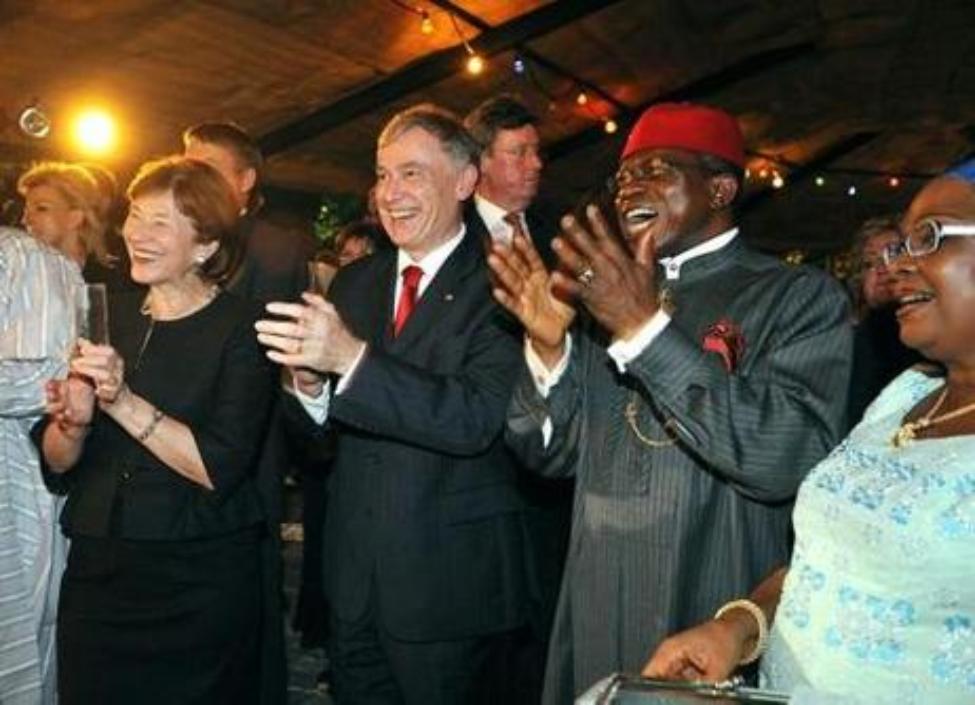I have been in Abuja for two days now. At the multilateral Africa Forum, the Nigerian cohosts as well as the participants made me even more curious about this country. I am pleased to be here on this bilateral visit.
With over 250 ethnicities and more than 430 languages and dialects in addition to geographical and regional diversity, Nigeria is a microcosm of the entire continent.
Nigeria's historical kingdoms such as the Sokoto Caliphate, today in the north of the country, or the Kingdom of Benin in the south were influential centres of high culture. The technical and artistic quality of the sculptures created by the Nok civilization from 500 BC to 300 AD is captivating. They, as well as the impressive bronze sculptures from the Kingdom of Benin, refute the perception of a "primitive" society, previously widespread in Europe, which so often had to serve as a pretext in order to justify colonization.
Today, in contrast, German archaeologists at the university in Frankfurt are researching the sculptures from the Nok civilization alongside their Nigerian colleagues. Likewise, academics from Germany and other countries are working closely with Nigerian experts to document and categorize the valuable works of art from the Kingdom of Benin that are scattered across the world. This is one way of acknowledging and expressing respect for the country's cultural achievements.
Taking this long history into account, it is no surprise that today Nigeria is one of the most important centres of African culture - culture that now has an influence on the whole world. I'm talking not only about the established figures in Nigerian literature such as Chinua Achebe and Wole Soyinka, but also internationally recognized young talents like Chimamanda Ngozi Adichie and Helon Habila who have dealt critically with central issues in Nigerian society. Nigerian music is listened to not just in Africa, but around the world. With up to 2,000 films per year Nigeria is the third-largest film-producing nation in the world. From financing to distribution, from the selection of topics to the way they tell stories, "Nollywood" films are unique. By now the film industry has become the second-largest source of jobs in the country after the oil industry.
Unfortunately, the significance of cultural exchange has too often been underestimated in our relations with Africa. It's time that this changed and that is why the Federal Foreign Office's "Aktion Afrika" programme plans to promote the exchange of German and African artists more strongly. The Goethe-Institut in Lagos has been a fixture of the cultural landscape since Nigeria's independence and now its activities in Kano are to receive additional support. I am looking forward to visiting Lagos and Kano in the next few days.
At the beginning of this speech I mentioned the diversity in Nigeria which has proven to be an enormous challenge to each government. Let me say this very clearly: the past military regimes demonstrated that they were not capable of taking on this task. A complex, multi-ethnic state requires the skill to balance different interests and peacefully resolve conflicts. In order to do this it is essential that there be open discussion in the country.
This is especially relevant when it comes to the distribution and use of the country's abundant oil revenues. In many countries around the world, a wealth of natural resources has unfortunately proven to be a curse. The crisis in the Niger Delta has developed over decades and cannot be solved overnight. President Yar'Adua has taken a notable step towards addressing the international dimension with the initiative on outlawing "blood oil", which he recently presented to the UN General Assembly. This deserves our support.
The Nigerians themselves have found very clear words for the "culture" of corruption, violence and impunity that has developed over decades. And it is the Nigerians themselves who are now fighting these tentacles through various functions and bodies - whether it be through the anti-corruption authority, within the framework of the Nigeria Extractive Industries Transparency Initiative or through countless civil society organizations. They all deserve our greatest respect and our support. In Nigeria we can offer our experience in building up administrative structures and the economy. Representatives of political foundations and development cooperation are working on this. They are doing good and important work.
My critical remarks on energy abundance should not detract from the fact that this abundance holds great potential for Nigeria's development. The Government can improve infrastructure with the export earnings. A reliable electricity supply is essential for the well-being of the population as well as for competitive production. Germany has a lot of expertise to offer in this field. At the same time we have a strong interest in Nigeria's largely unused gas reserves, too much of which are still simply being flared.
The energy partnership begun between Germany and Nigeria therefore has special potential. We now need to ensure that this partnership brings about concrete and visible results soon and does not just exist on paper.
In conclusion, allow me to return to culture. I spoke before of the significance of cultural exchange. This coming May, at my suggestion, the work of contemporary African artists will be shown in Berlin. The African curator of this project is Chika Okeke - a Nigerian of course!
It has always been important to me that artists take part in the Africa Forum discussions and state visits. They often raise the questions that we politicians too easily overlook. The German musician Wolfgang Niedecken has accompanied me several times on trips to Africa. I am happy that in addition to joining the discussion he'll also pick up his guitar and add a bit of spice to this evening together with Nigerian percussionist Happinex.
Let me invite you now to join me in a toast: To the well-being of the Nigerian people and to the friendship between Nigeria and Germany.


